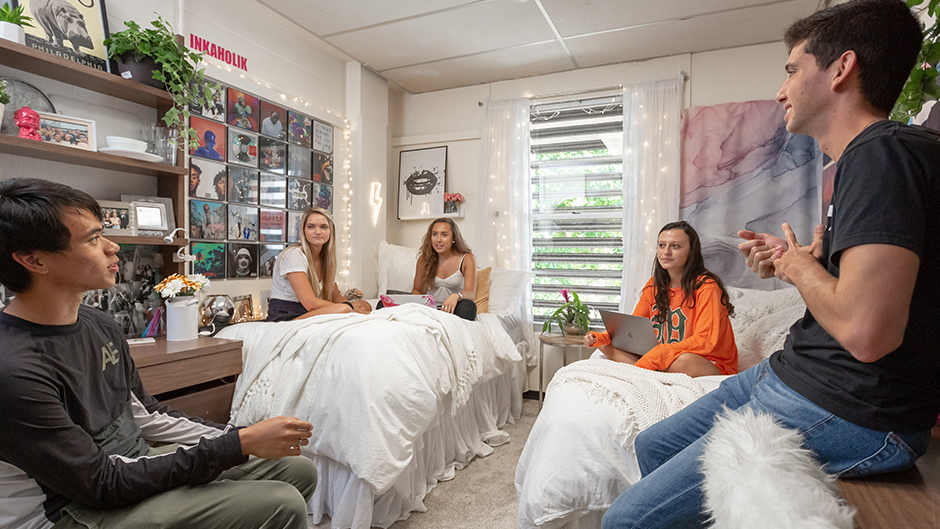The Resident Assistant (RA) plays an important role in shaping the on-campus experience. Meet Greta, a senior BFA musical theatre major at UM. Greta works in Stanford Residential College, and this will be her third year as a Resident Assistant.
When they arrive, who will help new students get settled into campus?
Resident Assistants, along with First Year Fellows (FYF), are among those who welcome first-year students when they arrive on campus. New students are also assisted with getting settled by what’s called Cruise Ship Move-InTM, a process whereby professionals get all of your items into your assigned room, making the whole move-in process much less daunting. [Available for those living in Hecht, Mahoney, and Stanford residential colleges.]
How do Resident Assistants help new students adjust to college life?
Resident Assistants are there to answer any questions new students may have when starting college at the University of Miami. They are great people to reach out to if you are feeling unsure of your place on campus, and can connect you to campus resources to help you make the most of your time at college.
What tips do you have for making friends as a first-year student?
Go to CanesFest! CanesFest is an event during ’Cane Kickoff with all the student clubs and organizations on campus. You will get to learn about lots of different clubs and have an opportunity to connect with their members. The University of Miami has so many different clubs, religious organizations, and sports teams; you will definitely find something that interests you.
What resources are available to first-year students on campus?
First-years have a small group of students with which they go through ’Cane Kickoff orientation; they are led by an Orientation Fellow. The orientation team prepares lots of events to welcome students to campus and prepare them for their college experience. Once ’Cane Kickoff is done, first-year students are supported by their RA and their FYF. Like RAs, FYFs can help with academic questions and things like registering for classes.
What events/activities can help students connect with fellow community members?
As I’ve mentioned, ’Cane Kickoff has a full schedule of activities that are great ways to interact with each other and the various departments on campus. ToppelFest, for example, is a gathering, usually with food trucks and giveaways, at the Toppel Career Center. Students are given opportunities to meet other first-year students and learn about Toppel’s services, like mock interviews and help with writing resumes.
How does the department of Housing and Residential Life (HRL) help students develop and maintain a healthy lifestyle?
HRL hosts programming throughout the year to help students develop healthy habits. RAs are students themselves and are able to provide advice on their own time management and other healthy living habits.
How can first-year students interact with faculty, and what support do faculty provide?
In addition to connecting with professors in the classroom, residential colleges have Residential Faculty who live in the building and are a great resource to mentor student residents. The faculty host academic-focused and community-building events. These events are great ways to break down the divide between professors and students.
What is the Residential Leadership Council and how can joining help first-year students succeed?
The Residential Leadership Council (RLC) is a group of first-year students that meets to discuss the residential college, coordinate programming, and develop leadership skills. The RLC is a great way to make connections with other student leaders on campus.
What security measures are taken for first-year students (and others) to feel safe in their residential colleges?
HRL Security Assistants work at the front desk of buildings from 10 p.m. to 8 a.m., monitoring who comes in and out of the building. University of Miami also uses the blue light system, which is a security system used by many universities. Blue light poles are set up around campus and, if you ever feel unsafe, you can press the blue button and University of Miami police will be notified.
Whom can students reach out to if they have any other questions about Housing and Residential Life?
You can email housing@miami.edu or give the central housing office a call at 305-284-4505.

